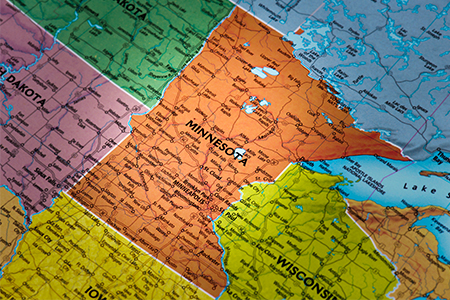You May Also Like
MINNESOTA CPA EXAM & LICENSE REQUIREMENTS 2024
Here is how to become a CPA in Minnesota.

Accountants are always needed in the business world. As the economy grows, so does the demand for those who can balance the books and handle compliance. Businesses also need experts who can help with budgets, taxation and matters of corporate finance. Accountants work as financial advisors alongside law enforcement agencies and in government. Though there are numerous credentials for accountants, there is none that surpasses a state-issued Certified Public Accountancy (CPA) license. Each state has its own requirements for CPAs. Here is how to become a CPA in Minnesota.
Like many states, Minnesota has high standards for academic achievement: you’ll need to pass the CPA exam, garner experience and ace the Ethics exam. The state neither requires that you be a state resident nor be a U.S. citizen, but you will need to have a Social Security number and be of high moral character.
Academic Standards
To qualify to sit for the CPA examination in Minnesota, you will need a baccalaureate degree and 120 hours of semester credit—or the quarter system equivalent. For your license, however, you will need a minimum of 150 semester hours. Furthermore, your academic work must meet certain criteria. Ideally, you will have a graduate degree. Since the growing trend these days is towards graduate degrees, this is the preferred pathway to your CPA license. Getting this work out of the way before you start your career will be a relief to you later, when you will not need the stress of school on top of managing your career.
The surest route is to achieve your master’s degree from a program that has a level-three accreditation from an agency recognized by the U.S. Department of Education. Alternately, you can take one of the following routes:
Graduate degree from a level-two accredited institution including 24 hours of undergraduate credit covering these topics:
- Auditing
- Financial Accountancy
- Taxation
- Cost Accounting
15 hours of accounting at the graduate level including these subjects:
- Auditing
- Financial Accountancy
- Taxation
- Cost Accounting
Bachelor’s degree from a level-two accredited institution including 24 hours of graduate or undergraduate coursework that includes these accounting courses:
- Auditing
- Financial Accountancy
- Taxation
- Cost Accounting
AND
24 semester hours in business-related coursework:
- Business Law
- Marketing
- Management
- Economics
Bachelor’s degree from a level-one accredited institution with 24 semester hours in accounting above the introductory level including the following:
- Auditing
- Financial Accountancy
- Taxation
- Cost Accounting
CPA Examination
Once your coursework is complete, have all official transcripts sent to CPA Examination Services:
CPA Examination Services – MN
P.O. Box 198469
Nashville, TN 37219
You must send original sealed transcripts. In fact, these may be sent directly from the registrar’s office of any schools you have attended. Be sure that all of your work is accounted for within your official documents. Even if you took a single summer course from a community or online college and that credit transferred to your college or university, it must be on file as an official document from the original institution.
To sit for the CPA exam, you must first receive a Notice to Schedule (NTS). This should arrive shortly after your transcripts and other documents are processed and approved. From the date of your NTS, you will have six months to schedule and sit for at least one part of the CPA Examination.
The Uniform CPA Examination is a test designed and distributed by the American Institute of Certified Public Accountants. You can take it at any Minnesota branch of Prometric, a testing agency. Prometric has facilities in these towns:
- Bloomington
- Duluth
- Woodbury
You may sit for all four parts of the exam in rapid succession, or spread them out over time. You will have 18 months to pass all four parts. Manage your time well, as many need to retake some or all parts of the test. Keep in mind that the CPA exam is one of the most difficult professional examinations in the United States and will challenge your mental acumen and writing skills. Each part must be passed with a score of 75. The four parts of the test are:
- Financial Accounting and Reporting (FAR)
- Auditing and Attestation (AUD)
- Regulation (REG)
- Business Environment and Concepts (BEC)
Ethics Examination
After you pass all four parts of the examination, there is one more test to pass—the Ethics exam. This is also given by the AICPA and is considered far easier than the CPA exam. You can order the self-study CD-ROM from the AICPA and the course will take approximately 11 hours. The CD will include practice questions. When you sit for the actual open-book exam, try to be diligent as you must pass with a score of at least 90.
Experience
The final hurdle to your Minnesota CPA license is the experience requirement. You will need to complete one year of work experience with a public accountancy, government agency, academia or private business. You will at least one, but no more than three years, to complete 2,000 hours of supervised work. Your work must be verified by a licensed CPA who will fill out and submit the CPA Experience Verification form.
Working as a CPA in Minnesota will provide you with a lifetime of career fulfillment. To learn more about licensure, renewals and reciprocity, visit the Board’s website:Minnesota Board of Accountancy.